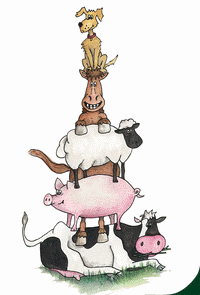Advice for Vets presented with rabies non-compliant Ukrainian pets
The UK's Chief Veterinary Officer, Dr Christine Middlemiss has announced advice for Vets, following the latest arrangements applying to people from Ukraine seeking refuge in the UK with their pets. In a letter to all Veterinary professionals, she offers guidance on what to do if you are presented with an animal for treatment that you suspect originated in Ukraine and has not completed a stay in quarantine, or been licensed into home isolation, or it has travelled to the UK on an EU pet passport.
Dr Middlemiss said: "We recognise that pets are central to so many families and people’s lives. We are making it easier for people to bring their pets here so we can support refugee journeys to a safe and stable life in the UK.
"Whilst we are facilitating the arrival of these pets, we must be mindful that the UK has long been rabies free. We need to protect this status for both public and animal health. Rabies is endemic in terrestrial animals in Ukraine so it essential that we facilitate pet movements in a way that maintains our biosecurity and ensure they have had the recommended veterinary treatment.
"We have streamlined the process for providing licences whilst ensuring that we manage the risks appropriately. Quarantine spaces in the UK are limited. We are therefore putting in place a risk-based approach to increase our capacity through the licensing of new quarantine facilities and using other isolation options such as boarding kennels and home isolation - where appropriate - for lower-risk animals.
"In quarantine, an official vet will make an assessment, blood test the pet, and administer a rabies vaccination if necessary as well as other essential healthcare treatment.
"In order for a pet to enter home isolation, APHA will initially make an assessment and determine whether the pet meets the home isolation criteria. If they approve, APHA will send the owner a home isolation form. The owner and their host in the UK will need to complete this and confirm that they can meet the disease control isolation standards before a licence is issued. This will include the availability of a secure enclosed garden (in the case of dogs) and whether the accommodation agreement allows for pets in the home, or if they have the homeowner’s permission for home isolation. If these standards cannot be met, we will pay for the pet to be isolated in a rescue centre or boarding kennel.
"We are not trying to identify people for enforcement purposes, our primary aim is to protect UK biosecurity, UK citizens and domestic pets and prevent the first rabies case in the UK for over 100 years."
If any animal is presented for treatment that you suspect originated in Ukraine and has not completed a stay in quarantine or been licensed into home isolation or it has travelled to the UK on an EU pet passport, please could you inform APHA at ukrainepettravel@apha.gov.uk under an email titled ‘Suspected illegal pet landing from Ukraine’. APHA will then make the appropriate arrangements for the animal to be assessed by a vet and possibly moved into quarantine if required.

